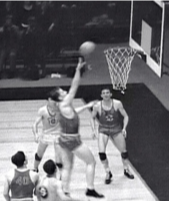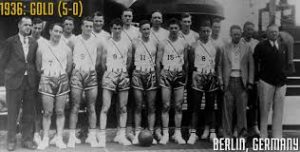The NBA Finals date back to 1947 (when they were known as the Basketball Association of America Finals) and the very 1st NCAA tourney was held in 1939. Olympic basketball competition is even older: it debuted as a demonstration event in 1904 and the men’s version became a medal sport in 1936, with the women finally getting their chance to go for the gold in 1976. The United States has dominated Olympic basketball competition from the start: the men have won 15 gold medals in the 18 tournaments they have participated in during the past 84 years, while the women have won 8 gold medals in the 10 tournaments in which they have competed during the past 44 years. Those of you who were looking forward to the 2020 Olympics opening ceremonies in Tokyo on July 24, 2020 will have to wait an extra 364 days, as the coronavirus caused a postponement until July 23, 2021. Due to the absence of college basketball since mid-March, HoopsHD’s Jon Teitel decided to fill the void by trying to interview as many prior Olympic players/coaches as possible so that you have something to read this summer while not watching the Summer Games. We continue our coverage by chatting with Jerry Johnson about his father Francis winning a gold medal at the very 1st Olympics in 1936. Today would have been Francis’ 110th birthday and we are proud to celebrate his memory.
Your father was born/raised in Kansas: what made him choose Wichita State? He was born in a little town called Hartford that is about 15 miles outside Emporia. My grandfather passed away when my dad was only 11. He had several siblings including his older brother Gene, who later became a coach. My dad ended up at Wichita State because Gene was the head coach there. My dad was also a champion magazine-seller, which helped him make a little money. He would trade a subscription for a chicken or 2 and he would just load them into a coop on his truck and then go sell them elsewhere. He did not graduate because he had too many other things going on during his senior year, but after getting married my mom made him go back and graduate.
What did he like the most about playing for Gene, and what was the not-so-best part? The best part is that they thought an awful lot alike. The hardest part is that Gene was a cocky kind of guy and my dad was the complete opposite of that. My dad would only say nice things about other people and was only married to 1 woman his whole life, while Gene had several wives.
In addition to basketball he played football, pole vaulted, and ran hurdles for the track team: which sport was he best at, and which sport did he enjoy the most? He is the only 3-sport 3-letter winner in the school’s Hall of Fame. Uncle Gene is in that Hall of Fame as well. He was the best at basketball but enjoyed playing all sports. He also became a really good golfer and even won a city championship 1 year. Playing cards/shooting pool was a given and my dad was excellent at both.
He allegedly had great hand-eye coordination that served him well in many sports including trap shooting/billiards: was it something that he was born with or did he have to practice it all the time in an attempt to become perfect? He was pretty much a natural athlete. 1 of the things that frustrated me the most was that he could eyeball a fence and see whether it was straight/level. I flew jets in the Air Force and was a good high-jumper so perhaps it is genetic. He would go to the Officers’ Club for card night and come home with a big wad of money: he never came home short because he could read the other players’ tells. He was a great storyteller and a great listener.
After graduation he played AAU basketball where he was a 3-time All-American and won national titles with the Globe Refiners and Healey Motors: what did it mean to him to receive such outstanding honors, and what did it mean to him to win a pair of titles? He was really proud of all of that. He coached my church league team and we had the best team in the league because he was such a great teacher. I have that same fault with my kids because if something is worth doing then it is worth doing right. He sponsored a junior college team for 25 years and was recognized for doing that: he just liked to see good basketball being played.
Gene was an assistant coach for team USA at the 1936 Olympics: were there any allegations of nepotism when your dad made the team? No: there were several players from the Globe Refiners who also made the team. My dad could have coached the Globe team himself because he was such a good player/teacher. Both Gene/my dad succeeded everywhere they went: my dad even helped Gene purchase a car dealership. My dad had a strong sense of right/wrong.
He was named captain of team USA: what did it mean to him to represent his country, and what did it mean to him to win a gold medal? It was the highlight of his life. He was the only unanimous selection by the sportswriters to be captain. Gene argued with the head referee and the ref tried to humble him by having my dad foul out of the gold medal game.
He served in the Navy during WWII: what impact did his service have on him either on or off the court? His service started after his basketball career. He had a bad ankle and his nose was broken 7 times: he had no septum left so they just took the bone out. He was the worst car driver you have ever seen because he would keep moving his foot up and down on the gas pedal. He was an elite athlete with a college degree and the Navy needed a lot of officers right after Pearl Harbor. He was part of Class 42-B that included athletes from many other sports, including future Olympic coach Bruce Drake. That got him into Annapolis and he got a ring from there, which was frowned upon by the guys who spent 3-4 years there to get their own ring. He was a player-coach for the Cadets’ basketball team and they won most of their games. 1 time he called a timeout, put himself into the game with his prematurely gray hair, and told a 6’7” player on the other team that if he kept bullying his teammates he would be sorry. The guy was later carried off the court…but nobody saw the foul that led to it! My dad had his neck broken once as well after crashing into the stage under 1 of the baskets. He knew how to use his butt/shoulders to get separation.
After retiring from basketball he worked for the John Deere Company and became a noted horse rancher who eventually produced 25 national/world champions: how was he able to follow his on-court success by becoming so successful off the court? He is in the National Appaloosa Horse Hall of Fame, as is 1 of our horses. I got him into the business and then he took over when I entered the Air Force. He was a national judge at horse shows. The key to any success is organization: he learned it from both basketball and the Academy. He set up a filing system on all of the Cadets and took the same color-coded flip cards with him to John Deere to keep track of all of their parts.
He passed away in 1997: when people look back on his career, how do you think that he should be remembered the most? He had several nicknames but 1 of them was “Senator”. I do not know how he got it but it was a sign of respect. He always called everyone by their name or “Sir”, and a lot of people respected that.
For more info about the 1936 US Olympic team check out “Sporting Labor in the Hollywood Studio System: Basketball, Universal Pictures, and the 1936 Berlin Olympics” by Professor Alex Kupfer at: https://cinema.usc.edu/spectator/35.2/2_Kupfer.pdf and “Netting Out Basketball 1936” by Rich Hughes at: www.amazon.com/Netting-Out-Basketball-1936-Remarkable/dp/1770679707




